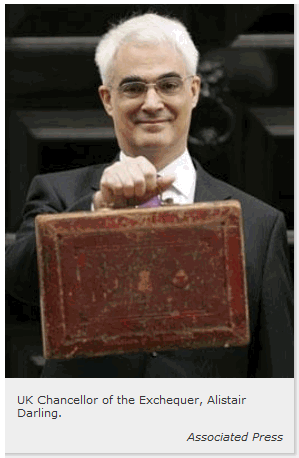|
|
|
|
|
|
|
News & Views item - April 2009 |
![]() Science
and the 2009-10 UK Budget. (April 23, 2009)
Science
and the 2009-10 UK Budget. (April 23, 2009)
 Alistair
Darling, Britain's Chancellor of the Exchequer delivered the 2009-10 budget
which included £1.4 billion to green technologies. But there is no new money for
research.
Alistair
Darling, Britain's Chancellor of the Exchequer delivered the 2009-10 budget
which included £1.4 billion to green technologies. But there is no new money for
research.
As ScienceInsider puts it: "The governmentís green credentials were very much on show with a new commitment to reduce carbon dioxide emissions 34% compared by 2020 to 1990 levels. To help achieve this the Chancellor promised £1 billion for low-carbon industries, £525 million for offshore wind projects, £435 million for energy efficiency, and £405 million to encourage low-carbon energy and advanced green manufacturing. That last pot will fund four pilot coal-fired power plants equipped with carbon capture and storage technology."
In fact that 34% cut by 2020 from 1990 levels is seen as a milestone in move towards meeting the UK government's stated goal of an 80% reduction in emissions by 2050.
Nicholas Stern, who led a review of the economics of climate change for the UK government in 2006, commented: "The government has recognized the importance of increasing research and development on technologies for capturing and storing the carbon dioxide that is produced by power stations using coal, gas and oil as fuel [but the initiatives] must be the initial step along the path towards a major structural shift in policy which we trust will follow over the coming decade".
However, what is perturbing the research establishment according to NatureNews is that "the Budget calls for the Department for Innovation, Universities and Skills (DIUS) to find £400-million-worth of additional "efficiency" savings in 2010Ė11. In addition, the research councils, which allocate government funding for science, will have to re-invest £106 million of their budget to support key areas of research with economic potential. The changes to the research councils' budget have "nothing to do with cutting basic research," says ChloŽ Somers, a spokesperson for the councils. "Our budget has remained the same."
But Royal Society president, Martin Rees made his view clear : "I am concerned that the balance within research councils has already shifted too much towards 'preferred areas'," while Nick Dusic, director of the London-based Campaign for Science and Engineering added: "The Chancellor has undermined the independence of the research councils... There needs to be an urgent review of this decision as it completely destroys the idea the research councils operate at armís length from government. Rather than boosting investment in the research base, like our international competitors, the government has moved money around.Ē
And even Paul Wellings, chair-elect of the 1994 Group of small research-intensive universities, and much inclined in the past to hoe the establishment's row says, "If this cut leads to a reduction in the unit of resource for teaching or research it will be destabilizing for the sector and damaging to the country's chances of economic recovery."